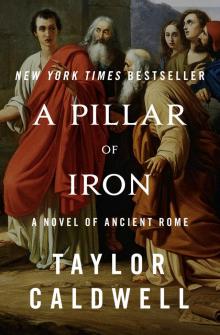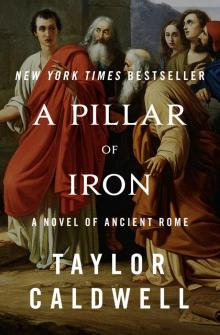- Home
- Taylor Caldwell
Glory and the Lightning Page 2
Glory and the Lightning Read online
Page 2
CHAPTER 2
Thargelia sat with her choicest maidens—all chosen for both their beauty and their intelligence—in the outdoor portico facing the west. It was her favorite hour, before dining, for she did not care for the day during which she slept after a night of festivity. But bathed in scented water, oiled with fragrance, painted delicately and powdered, her hair arranged artistically, her peplos draped to her satisfaction, her pins sparkling and a necklace of jewels about her neck to hide the sallow wrinkles, she felt capable of facing life again. “The night was made for love, reflection, philosophy and laughter,” she would say. “But the day is made for wars, peasants, arduous workers, muscles, men of activity, and farmers and goats and sheep. In other words, for those who care little about the delights of living and know nothing of them, being engrossed with labor and sweat. From this, we hetairai have been mercifully delivered; while the laborious wives sleep we rejoice in the company of their eminent husbands. Truly, our lives are enviable, and that is why we are hated by the stupid and lightless matrons of energetic households.”
She had aged but little over the fourteen years since Aspasia had been delivered by her mother to this house. “A woman must not frown; it creates wrinkles on the brow and between the eyes, and gentlemen detest wrinkles. Nor must she laugh too much; that induces furrows about her mouth. A merry face, yes, always. But never one which resembles the masks of the theatre, with too much emotion and emphasis. A soft smile, with a regard to curvature, a twinkling of the eyes, as you have been taught, a gentle inclination of the head—these are desirable and do not age a woman. They enhance her charm. Gestures, too, must never be too emphatic. It annoys gentlemen, for they do not like vigorous women, except in their kitchens and in their beds. A woman must always imply; she must never assert. I repeat these admonitions, my treasures, so that you will be successful and rich and endlessly amusing and seductive.”
There were eight among her choice maidens, and among them was her favorite, Aspasia, of incredible beauty and incredible intelligence, which she had been taught must never be aggressive among men. “Compliance, always. Entertainment, always. But never without elegance.”
She controlled the diet of her maidens sedulously, and as vigilantly as she preserved their virginity, which would be delivered to the richest and most eminent bidder, and for a very high price to Thargelia herself.
But the maidens were not virginal in their minds and their hearts. “Even green fruit must prophesy ripeness and deliciousness, my treasures.” She wished a sheen on her maidens, so she encouraged love among them—with discretion so that they would later be lovers of men and not lovers of women. In truth, if a maiden became too ardent over a sister neophyte Thargelia would remove her to another building where she could be trained to be a pleasure to some rich widow or dissatisfied wealthy matron.
“A woman’s complexion and the softness of her body skin are her greatest assets,” she would teach the young girls. “Therefore, they must not be exposed to the sun, but shaded at all times, and carefully covered, for the kiss of Phoebus burns and darkens and turns to fissured leather, and such is repulsive to gentlemen of taste and discrimination.” The girls were bathed only in water in which perfumed oils were dissolved, and then sweet lotions were applied. Hair was brushed night and morning for at least an hour, with the help of slaves, and flesh was massaged to the polish and smoothness of marble. “A woman’s natural beauty, no matter how great, begins to fade at eighteen and twenty, if wantonly neglected. She must begin to preserve it no later than the age of five years, and guard it always. Many ladies of this school are notable beauties even in their sixties. It is an art which women must cultivate all their lives, for men, alas, no matter their intellectual endowments, never look below a woman’s complexion, firm breasts and rounded loins and thighs, to discover any mental attainments. It is the rare man who appreciates a woman’s mind; in truth, men are irritated by it unless it is accompanied by a handsome face and body. Then it is an added joy. A full rosy mouth which invents epigrams, and which can discourse on learned things, is delectable. But withered lips uttering wisdom cause a man to flee.”
She would say, “Only a girl at puberty can face daylight without fear. After fourteen or fifteen the light of Artemis is infinitely flattering, and the light of soft lamps and candles. There is a new fashion now, of having lamps suspended from the ceiling. Avoid them like a traitor, for they are indeed traitorous to any woman beyond puberty.”
All the maidens, and not only the eight of the choicest, found little leisure in the school for courtesans. They attended classes presided over by female and male teachers of the best mentality, where they learned—not the arts of a household, which were the province of illiterate ladies intended for marriage by their parents—but the arts of politics, philosophy, exquisitely perfect language, rhetoric, music, dancing, the arrangement of garments, the nuances of perfumes, seduction, conversation, history, gentle athletics to preserve the figure and enhance it, a smattering of medical lore, mathematics—“One must deal with bankers later”—artistic placing of furniture, selection of fabrics most flattering, graceful movements, hairdressing, charming sophistries, penmanship, the keeping of books, literature, poetry, sculpture, painting, science, but, above all else, how to please and entrance a man and all the arts of love, including perversions.
“Young men are bulls,” Thargelia would say with severity, “therefore, unless they are tremendously rich and important, I deliver none of my maidens to them. A slut and one of my delicate courtesans are all the same in bed to them, and, as they have the identical equipment, there is no distinction. So, I am careful not to arrange matters between them and one of my young ladies, except on rare occasions and only by consent of the young lady. There is a greater danger, too: A maiden may fall in love with a young man, alas, and there is no worse fate, for young men are capricious and are soon discontented even with the most desirable of girls and look for novelty and are not interested in conversation. But a middle-aged man needs to be coaxed, and when coaxed to fulfillment he is endlessly grateful, and gratitude leads to pleasant establishment, money and jewels. Also adoration. Be careful, then, about love, which is a deceiver and a liar and men are also all deceivers and liars, and must be dealt with capably, or a woman is lost.”
The maidens were taught delicacy. “There is nothing more abhorrent than a coarse lewd woman,” said Thargelia and the other teachers. “Never must an indecent word cross your lips or a lascivious jest, not even in passion—which I trust you will never feel. (Passion can destroy a woman.) You must keep in mind that you are great ladies, of taste and discrimination and learning. You must always be in control of your emotions, and never utter a hasty harsh reproach, no matter how provoked. Pleasantness is most desirable.”
Once Aspasia said in her lovely soft voice though her eyes flashed with rebellion: “We are, then, only toys for the pleasure of men who may be inferior to us.”
Thargelia smiled at her, for it was impossible to be irritable with Aspasia. “Say, better, that we are jewels, precious jewels. How is a jewel preserved? In fine cloth, guarded and cherished, valued above all things, adored, proudly displayed. We are not utensils of the kitchen. They serve their purpose, and are used by wives, whose husbands give us gold and gems and lay their heads on our knees and worship us. Do they worship their wives? They flee from them.”
The girls were taught intensively of the nature of men, and how to preserve themselves from entanglements in their own emotions, which could ruin them. Thargelia was vehement in her admonitions that the maidens must cultivate a contempt for men, which, certainly, they must never reveal.
“Once you become contemptuous of men you will always be serene in their company, and even happily affectionate, as one feels affection for a dog. For your contempt will make you impervious to destructive inclinations, and devoid of passion and natural indignation, and will render both your emotions and your countenances bland and unwrinkled and undistorted. Contemp
t banishes pity. Once you pity a man, you will love him, and that is a detestable and alarming and dangerous condition, and leads ultimately to despair. Certainly, you must assume an attitude of discreet devotion, for men desire all women to be devoted to them. But never must you be truly devoted. It is suicide.”
Love, in short, must be for one’s self, and never must it be wasted on a man. “Let the poets sing of love,” said Thargelia. “But that love is not for their wives; it is only for women who contain their sentiments and are elusive as well as daintily wanton, and are never fully possessed. Had Artemis fallen in love with Acteon, and had married him, he would soon have become wearied of her love and sought a more fugitive joy. Men demand a woman’s whole heart. Pretend to give it, and then when he feels secure in its possession give him cause to feel alarm, not overtly, but with a smile, an averted head, a gentle disentanglement from his arms. He will then begin the pursuit once more, and sue for your affections with gold and jewels.”
“We must, then, live only for ourselves,” said Aspasia with the most demure of countenances.
“Who else is there but ourselves?” Thargelia asked. “Once I listened to the dissertations of a famous philosopher who was dexterous and wise enough to convince anyone that all is delusion, that we are all dreams except to the dreamer, that none exists but one’s self. How can we prove the existence of any other? How can we be certain that we are not entirely alone in a dream?”
The school engaged expert men and women who employed all the arts and perversions of love before the fascinated students. “There is more to such joys than mere copulation, which we share with the beasts,” Thargelia would admonish, “and has for its purpose gross reproduction. It is a hasty affair, such, and without delicacy or enhancement. While you must restrain your own selves from the utter pleasure, you must learn to give pleasure to the utmost, and if engaged in that pleasure yourselves you cannot be expert with a man, nor make him delirious with exotic sensations. Be voluptuous but never vulgar. Be abandoned daintily, but never with complete abandonment. A veil is more alluring than a naked body. Subtlety is more to be desired than shamelessness. A woman never must give all, not even in pretense, except for a moment or two.”
She trained the maidens never to express disgust or aversion, or even to feel either. “However,” she would say, “if you cannot control such revulsions completely invent epigrams or a poem while engaging in love with a man, or think of a lovelier way to dress your hair, or your money. So long as you are clever and proficient, and remember your lessons, the man will never guess your true feelings. Again, a woman must never fully surrender herself at any time. She must never listen to pleas, but only smile beckoningly, and promise.”
As she sat with her maidens this sunset she rejoiced in their beauty, and especially in Aspasia’s, for the promise of the maid’s childhood had not been false but in truth it had not fully prophesied. Aspasia was taller than the other girls, which had first made Thargelia apprehensive, and then she remembered the greeting recorded by Homer: “Daughter of the gods, divinely tall and most divinely fair!” Aspasia was certainly divinely fair, and Thargelia could not recall any of her earlier maidens who could compare with her, nor even her present companions. Amidst all that loveliness of black and brown and russet and fair locks, of brilliant eyes and rosy cheeks and white throats and young creamy bosoms, of dimples and curved red lips and alabaster chins and springlike bodies, Aspasia was a girlish Aphrodite among mere mortals. They diminished, for all their loveliness, in her presence, as bronze dims before gold, and they became, despite their choice and unusual grace and sensuous charms, mere milkmaids before a queen. They all wore the plain white peplos which announced their virginity, and with silver girdles of modest design, but the peplos became radiant upon Aspasia’s perfect body, hinting of sensuality and incomparable delights. There was a translucence about her flesh, so that strong sunlight seemed to strike through it, rendering it almost transparent in its tints of rose. Her golden hair was, as her mother had said, a web of light, floating in the slightest wind, and falling to her knees when it was unbound, a gilded cloak which she loved to gather about her after her bath. Thargelia, the pragmatic and the shrewd, felt poetic when she gazed at the girl’s countenance, the oval of the cheeks ending in a dimpled chin of tender roundness, and the whole head set upon a long slender neck as flexible as a serpent’s and as pale as milk. Her nose was of the classic Grecian shape, worshipped by sculptors, and her mouth, deep red and velvety soft, was without flaw, neither too generous nor too small, and when she smiled dimples twinkled about it, enchantingly. Her eyes were unusually large, set in fine pale violet shadows and surrounded by thick golden lashes, and were of an arresting color, like light brown wine and luminous.
All this, at the age of fourteen, and a virgin, was enough to drive men out of their senses, Thargelia would think with pleasure, but beautiful though Aspasia was her intellect surpassed it. Thargelia had sometimes regretfully observed that unusual beauty was sometimes accompanied by lesser intelligence, but this was not so with Aspasia. She was not only accomplished in music, and had a voice of strong sweetness and range and feeling, but she was a superb dancer whose movements were at once carnal and innocent. Her conversation was not by rote or mere memory from her teacher’s lessons, and sparkling and witty, but excelled in subtlety and intimations and a naughty impudence which aroused laughter even among the sullen and the most grave. She observed everything and her comments were inventive and full of perception, and often startlingly wise and deeply thoughtful. She outwitted her teachers in an exercise in rhetoric, and could declaim movingly on almost any subject, and she had a gaiety which aroused gaiety where sadness lived before. Thargelia feared that at times that there was a power not of the flesh but of the mind in Aspasia, and that Aspasia’s thoughts were not always feminine. Alluring beyond description though she was, and an ecstasy to the eye, her remarks were sometimes too sharp and pungent, too scornful of pretense. For this reason Aspasia’s teachers endeavored to teach her self-control more than they taught the other girls, and though she was acquiescent and listened carefully there would appear a shining and shifting glint in her eyes, humorously defiant.
This glint had been particularly present this warm and scented evening in the outdoor portico, as if something had aroused Aspasia’s latent bent for rebellion, and so Thargelia’s remarks had been pointed as she glanced frequently at the girl. Did not the maiden realize that she had the appearance of an empress and a mind which could command respect even from the most learned men, and that these gifts must never be threatened by overt contempt and hasty repudiations and an air of impatience? Men did not like forward women, and Aspasia, for all her charm and grace and beguiling ways, could be ruthless and forward, and could reveal her disdain for fools. Sometimes her beauteous eyes and wonderful face would glitter or darken with temper or resentment, and passion would leap over her features like lightning, not the passion of a sensual woman but the passion of an angry one or one who found the present conversation distasteful.
“You wished to speak, Aspasia?” asked Thargelia, seeing that the maiden’s countenance was changeful with seething thoughts.
“Yes, Lady,” said the girl at once, with a promptness more like a youth’s than a girl’s, and her entrancing voice was clear and forceful. “Am I not a woman, with flesh and blood and mind and emotions and opinions? Yet I am to suppress all these, make all these subservient, in the service of a man, who may be inferior to me despite his wealth and position! Am I to pretend that before him I am only a mere female, though lettered and excelling in learning and have the passions of a human creature who has observed much and thought even more? Yes, Lady, this you have taught me. I find myself in revolt against such a fate.”
Thargelia smiled faintly, though she was somewhat frightened. “Did we women make this world? Was it we who ordained that the female be subject to the male, even when he is less intelligent than ourselves, and coarser and more stupid? Nevertheless, w
e can rule men as no man can rule them, and enslave them at our will. We are a mystery to these grosser creatures and in our mystery lies our power. They both fear and adore us, for we are more subtle and far more clever and have the strength of earth in our flesh and in our spirits. We are unsurpassed at gentle and deliberate deceit, and we laugh in our hearts. The goddesses are swifter than the gods, and more wily, and you will observe that Athene and Aphrodite and Hera are revered by the gods as well as loved, and that they can strike terror even into the soul of Zeus, the king of them all. Let us cherish these thoughts, and think of our resplendent futures.”
She added, with a wider smile and an uplifted admonishing finger: “Who really rules gods and men? Aphrodite, the goddess of love and beauty, the unashamed voluptuary. Even Athene, wiser than gods and goddesses, or Hera herself, is not worshipped with such total devotion, nor does she move worlds as does Aphrodite. The loins of the goddess of love are more powerful than the brow of Athene, and Aphrodite is not a virgin, and has breasts.”
The girls laughed happily and even the dissenting Aspasia was forced to smile.

 Testimony of Two Men
Testimony of Two Men Wicked Angel
Wicked Angel The Arm and the Darkness
The Arm and the Darkness Answer as a Man
Answer as a Man Grandmother and the Priests
Grandmother and the Priests On Growing Up Tough: An Irreverent Memoir
On Growing Up Tough: An Irreverent Memoir Ceremony of the Innocent
Ceremony of the Innocent The Listener
The Listener Bright Flows the River
Bright Flows the River The Earth Is the Lord's
The Earth Is the Lord's Dialogues With the Devil
Dialogues With the Devil A Tender Victory
A Tender Victory This Side of Innocence
This Side of Innocence To Look and Pass
To Look and Pass The Strong City
The Strong City Balance Wheel
Balance Wheel A Pillar of Iron: A Novel of Ancient Rome
A Pillar of Iron: A Novel of Ancient Rome Glory and the Lightning
Glory and the Lightning Dear and Glorious Physician
Dear and Glorious Physician The Wide House
The Wide House The Final Hour
The Final Hour Never Victorious, Never Defeated
Never Victorious, Never Defeated Unto All Men
Unto All Men The Turnbulls
The Turnbulls Your Sins and Mine: The Terrifying Fable of a World Without Faith
Your Sins and Mine: The Terrifying Fable of a World Without Faith The Eagles Gather
The Eagles Gather Let Love Come Last
Let Love Come Last The Devil's Advocate: The Epic Novel of One Man's Fight to Save America From Tyranny
The Devil's Advocate: The Epic Novel of One Man's Fight to Save America From Tyranny A Prologue to Love
A Prologue to Love Maggie: Her Marriage
Maggie: Her Marriage The Late Clara Beame
The Late Clara Beame Melissa
Melissa Great Lion of God
Great Lion of God Captains and the Kings
Captains and the Kings Dynasty of Death
Dynasty of Death No One Hears but Him
No One Hears but Him The Sound of Thunder
The Sound of Thunder There Was a Time
There Was a Time Time No Longer
Time No Longer I, Judas
I, Judas The Devil's Advocate
The Devil's Advocate The Romance of Atlantis
The Romance of Atlantis A Pillar of Iron
A Pillar of Iron On Growing Up Tough
On Growing Up Tough Your Sins and Mine
Your Sins and Mine